ProCamp Rams are the sub-$100K camper vans Americans are thirsting for
Americans have long stared enviously at Europe, where camper vans nearly as affordable as everyday passenger cars roam highways and countrysides. Meanwhile, back in the US, it’s big news when a new camper van limbos below six figures. New Wisconsin-based brand ProCamp doesn’t quite hit European-level low prices, but it offers a progressive lineup of Ram Promaster camper vans with prices discounted to between US$61,000 and $103,000, injecting the American market with a full fleet of more affordable getaway van options.
Like a number of other American-market camper van brands, including Caravan Outfitter and VanDoIt, ProCamp debuts as the spinoff of an automotive dealership business. Plymouth, Wisconsin’s Van Horn Automotive Group leaned into the pandemic RVing craze and launched the ProCamp brand last year.
“We were selling a lot of Promaster vans to people who were customizing the interior for living on the road,” Adam Gaedke, Van Horn’s VP of dealership operations, said when announcing the brand in 2021. “After seeing a few designs and considering our resources, I had the idea that we could do this ourselves.”
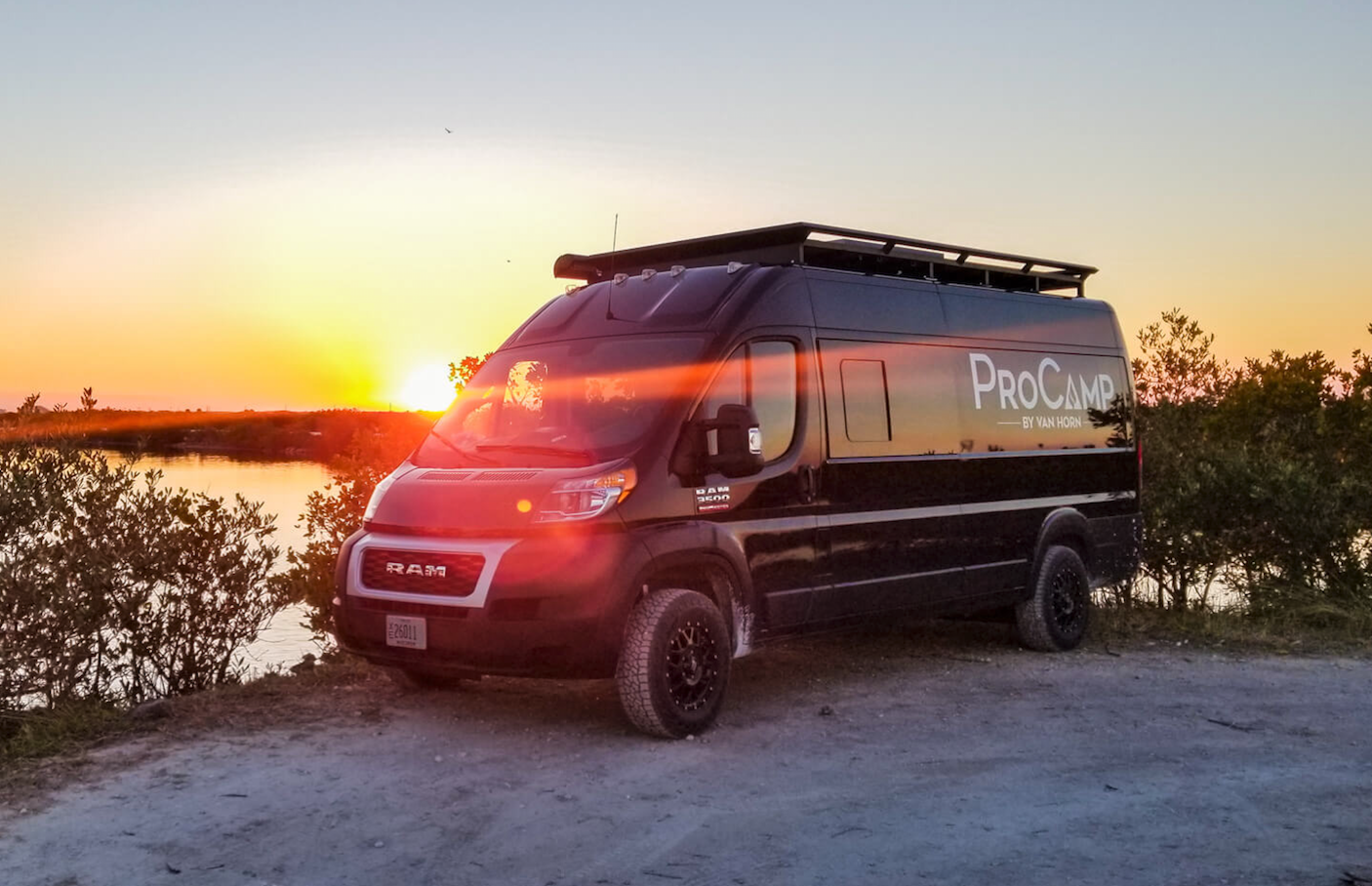
ProCamp by Van Horn
Gaedke reached out to childhood friend Adam Schneider, manager of nearby camper van conversion startup CW Upfits, and together they got to work creating a series of camper van packages. Each build comes atop a brand-new 21.5-ft (6.6-m), 159-in-wheelbase Ram Promaster 3500 with 3.6-liter V6 engine, six-speed automatic transmission and OEM warranty. The Promaster isn’t available as an all-wheel-drive, but ProCamp adds all-terrain tires to the FWD van, adding some extra traction for the rugged, all-weather conditions in which a camper van is likely to find itself.
The most basic ProCamp van is something of a DIY or custom-build starter shell in which Van Horn takes care of the structural work – interior framing, sub-flooring, insulation and electrical pre-wiring – leaving the details up to the buyer. At $61,575, it’s positioned as an affordable start toward one’s van life dreams.
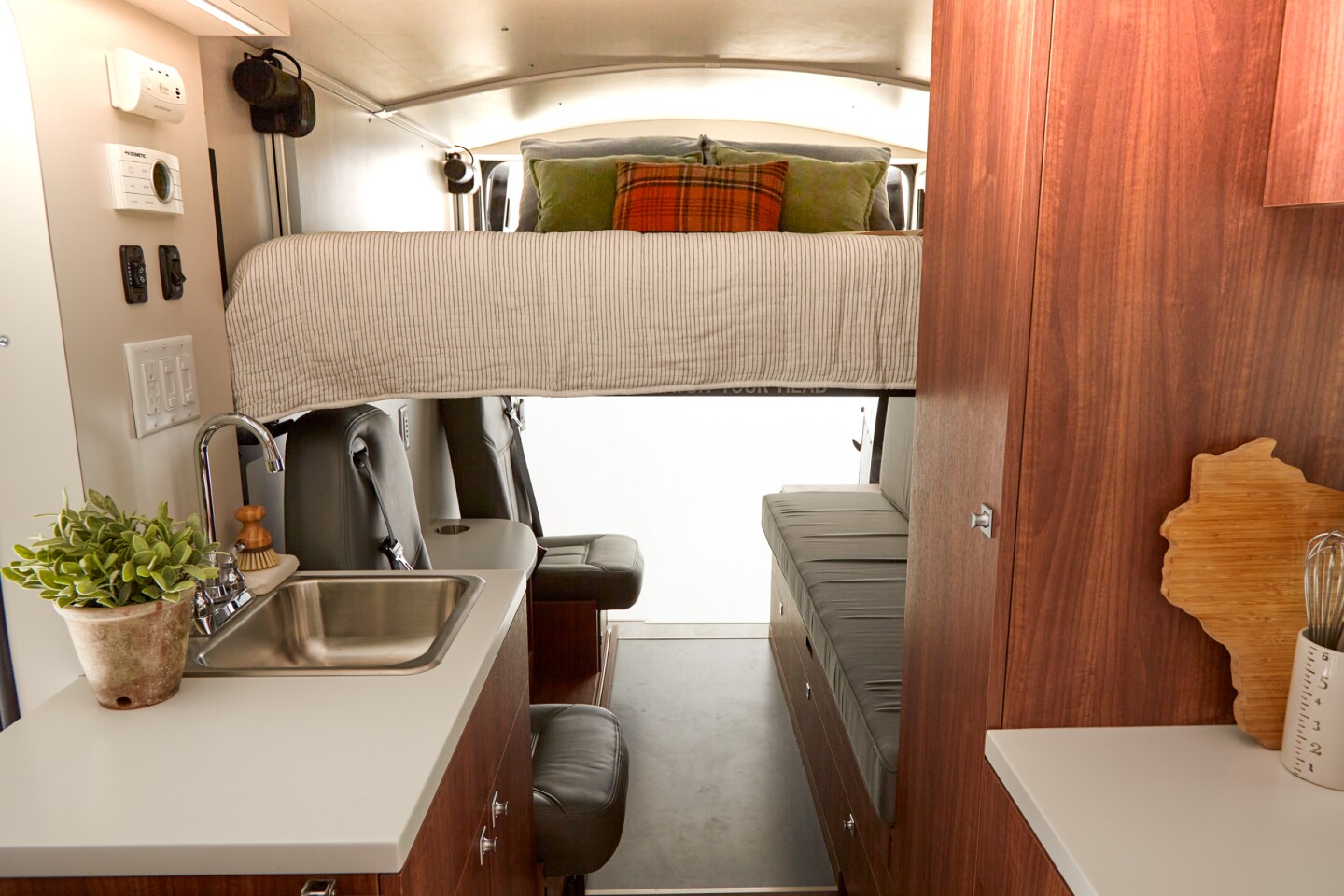
ProCamp by Van Horn
We think Van Horn really hits the sweet spot with two of the next vans up its line, the $84,500 Base Jumper and the $87,000 Cross Country. The Base Jumper has a full camper van floor plan that starts in the back with a height-adjustable rear bed over top a sidewall sofa set across from two side-facing passenger seats with seat belts. The seats and sofa team up to create a rear lounge during the day, and the sofa stretches out into a second double bed at night, allowing the van to sleep a total of four people, bunk bed-style.
Even with two rear passengers, there’s some center-aisle space left for cargo. A standard slide-out utility tray makes it easier to access the coolers, camping boxes and other stored cargo upon arrival and doubles as an outdoor dining table. With no rear passengers, it can comfortably store larger equipment like bicycles.
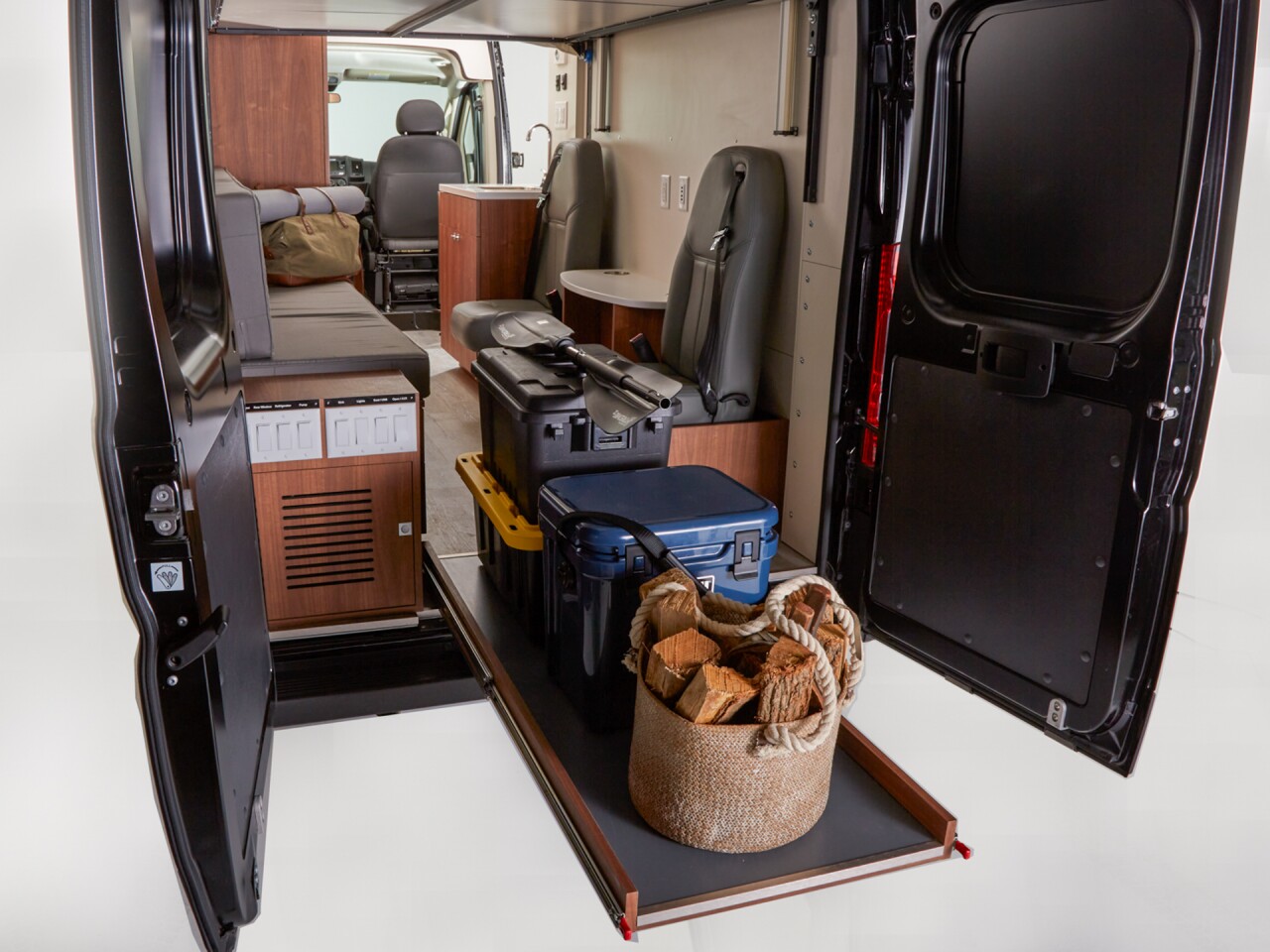
ProCamp by Van Horn
Fore of the rear lounge, the Base Jumper packs a large kitchen area that spans the aisle. The small sink block inside the passenger-side sliding door includes a flip-up worktop extension. There’s no inbuilt stove, leaving owners to bring their own camping stove. The 48-L fridge is located below a longer countertop on the driver side, surrounded by loads of storage space in the form of cabinets and drawers. A full-height wardrobe stands at the very rear end of this area.
The Base Jumper also comes standard with a 1,300-Wh battery, 2,000-W inverter and roof-mounted solar panels, with a series of GFCI-protected outlets and USB ports supplying access to that power. Fresh water and waste water store in individual 18.9-L tanks.
The ProCamp Cross Country has the same amenities as the Base Jumper but tacks on a full-size roof rack for added storage and a retractable awning. Van Horn also offers the $86,000 Land Sailer, which does not have a roof rack or awning but includes interior add-ons like AC and heating. The $97,500 Breakaway is an off-grid-ready van that combines all the indoor/outdoor amenities of the Cross Country and Land Sailer packages. All models feature the same four-seat/sleeper rear lounge layout.
What we really like about Van Horn’s approach with the Base Jumper and Cross Country is that it strips away the extraneous amenities that many campers and road travelers can live without to get prices lower. Major American camper van manufacturers often make things like air conditioning, microwaves and heating standard, even though some buyers could easily leave those types of luxuries behind.
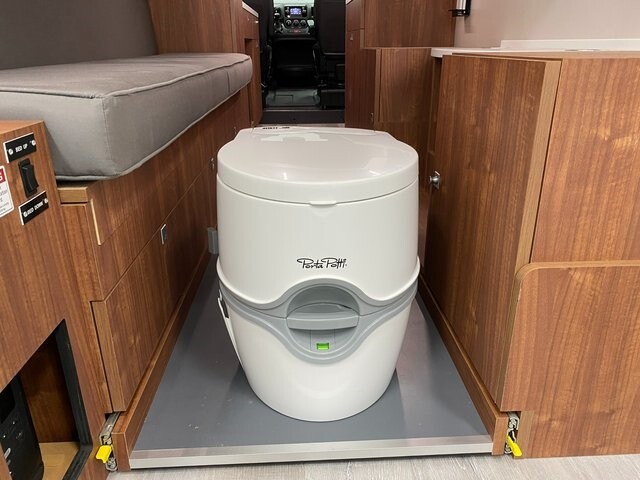
ProCamp by Van Horn
Some might argue that Van Horn goes a little too far in leaving out a bathroom in all its builds, even though it could fit one by shortening or eliminating the driver-side cabinet console, but the addition of a bathroom would certainly push its prices higher. The $102,500 Destiny flagship model does come standard with a portable cartridge toilet and is optimized for two people, deleting the rear captain’s chairs in favor of extra cabinetry.
Van Horn sells the ProCamp vans online and through its Rental and Commercial Fleet dealership in Plymouth, Wisconsin. It offers rentals through Outdoorsy.
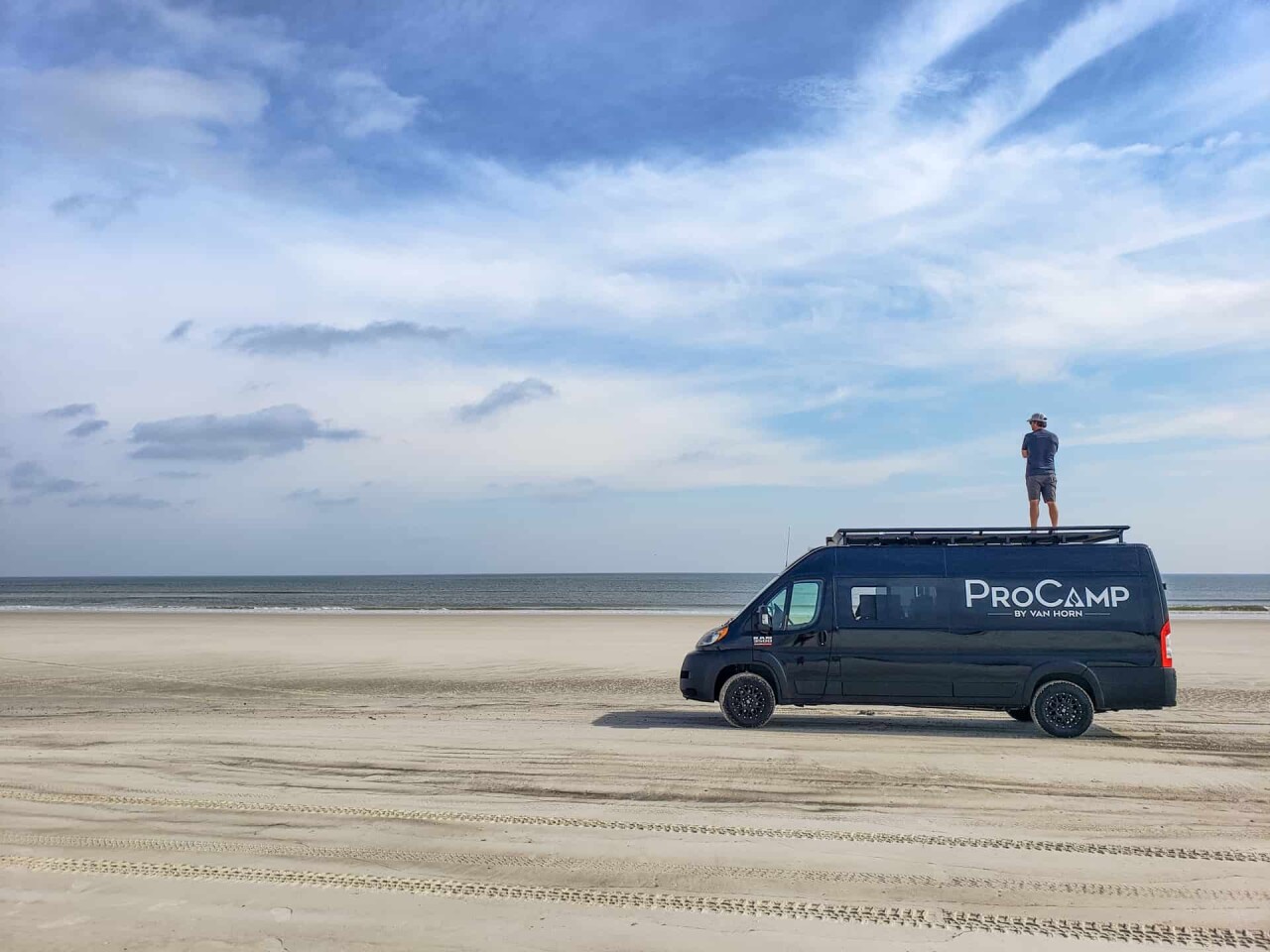
ProCamp by Van Horn
Current ProCamp pricing includes discounts ranging between $13,999 and $18,999, depending upon model. Van Horn lists the expiration date of that discount pricing as December 31, 2023, so it shouldn’t disappear too quickly, but given how in demand RVs are at the moment, it’s easy to see how the company might sell out of vans through 2023. Seriously interested buyers should consider acting quickly to lock in the best price.
Source: ProCamp








